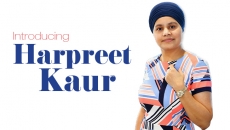The sequel to her debut novel "The Ivory Key" arrives this November
A rare Young Adult novel inspired by Indian culture and mythology, "The Ivory Key" debuted to rave reviews in 2021 from Publishers Weekly and Booklist.
Set in a world where magic is a physical (and scarce) resource, four perpetually at-odds royal siblings put their differences aside to find the key, believed to unlock an untapped source of magic vital for the survival of the kingdom of Ashoka. Alas, their motivations vary and will lead to conflict sooner or later.
Tamil-American author Akshaya Raman wrote "The Ivory Key" as the first in a two-book series. The second part, "The Crimson Fortress," hit the bookstores on November 14th.
A Bay Area resident and biology graduate, Raman traded a career in science for fantasy writing, a transaction that so far has paid off. Writing "The Crimson Fortress" took Akshaya to Rajasthan —where she visited forts and step-wells she would later incorporate into the story—Tamil Nadu (her home state) and Goa.
You've mentioned how much you enjoy the research process when writing a novel. Was "The Crimson Fortress" any different compared to what you went through with "The Ivory Key"?
With "The Crimson Fortress," most of my research was online, but I was fortunate to go to India at the end of last year and visit some of my sources of inspiration. I was excited to incorporate the descriptions and experiences of what it felt like to walk through those ancient monuments. I could also talk to my grandma and ask her questions like, "If I were to break into a temple, how do I do that?"
How far ahead were you in "The Crimson Fortress" when "The Ivory Key" came out? Did the first book's reception impact your original plan for the second?
I had a draft done but ended up making significant edits. I didn't let comments affect my original plan, but knowing what people liked helped me highlight them. For instance, food is abundant in book one, so I ensured that "The Crimson Fortress" also featured a greater emphasis on culinary elements. I was glad that what I loved about "The Ivory Key" resonated with people and felt I could stick to my vision. I knew where the characters would end up emotionally and wrote toward those moments.
Regarding "The Ivory Key," you mentioned there were parts of you in all four siblings. Did that change in "The Crimson Fortress"?
That's still true, but how I related to them changed slightly. I felt more connected to Vira (the Maharani of Ashoka and the main driver of the action) because her journey is more relatable. My experiences going through the publication process informed my vision of her.
There's a thread you leave dangling at the end of "The Crimson Fortress." Are you giving yourself a chance to revisit this world at a later date?
Never say never. There are more stories that can be told in this world. I don't have any plans right now to do it, but there's a door open.
After reading both books, I've noticed they exude more vitality and positivity compared to the typical YA saga. Was this intentional?
It was important for me because, often, with YA fiction, the characters make one mistake, and their lives are over. When characters are so young, you're doing them a disservice by saying whoever you are at 16 is who you will be for the rest of your life. I knew from the very beginning I wanted (the story) to be more hopeful.
What are your writing habits?
I work most days a week. I'm a morning person, so I get my writing done early. I have my daily ritual: sitting down with coffee and my journal.
Considering your biology major background, do you believe the scientific method has helped you as a storyteller?
Two of my best friends are doctors. Sometimes, I would call them to get them to walk me through an injury and figure out how bad it could get without impeding the plot to move forward. It was helpful to have that knowledge to figure out what questions to ask and how to weave the answers in.
What's the best editorial advice you've received?
One of the most foundational lessons I learned was that a scene must always be doing multiple things: develop a character, showcase a relationship, do some world-building, and move the plot forward.
How would you say your heritage has determined your abilities as a storyteller?
I wanted to write the kind of stories I wanted to read when growing up and see the culture, the food, and the clothes I was familiar with. I loved fantasy and adventure but rarely saw South Asian people in them, and I had a hard time seeing myself in those worlds.






